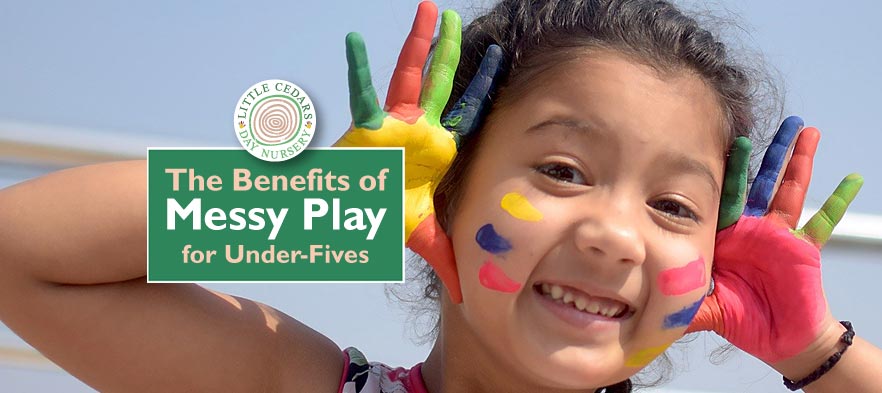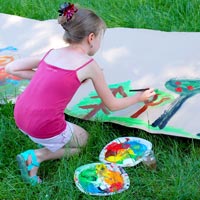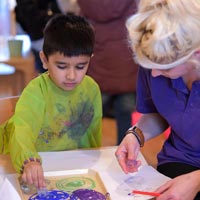The Benefits of Messy Play – for Under-Fives

Messy play is enjoyed universally amongst children, especially the very young. In fact, there is probably not a child in the UK that doesn’t enjoy it!  Being let loose with coloured paints, art materials and creative opportunities is sure to bring a smile to their faces and a sense of enormous fun, creativity and discovery. No doubt too; they’ll be proud to show others their creations!
Being let loose with coloured paints, art materials and creative opportunities is sure to bring a smile to their faces and a sense of enormous fun, creativity and discovery. No doubt too; they’ll be proud to show others their creations!
Is messy play all about having fun and being creative, though? Well, that’s important and it is partly about that. However, messy play also has a whole host of other benefits and purposes. In this article, we’ll take a look …
Learning Instinctively About the World
There’s something inherently natural about messy play — it instinctively appeals to children, giving them spontaneous ways to discover new aspects of the world and the properties of the things in it. Getting ‘hands-on’ with malleable media and colourful pigments surely is one of the most natural, fun ways for children to learn through play and discovery. Who doesn’t remember playing with wet sand on a beach, or being drawn to the joys of wet paint, mud or clay as a child? It simply is great fun and a way for children to let loose and get really messy — something they’re usually discouraged from doing.
Advancing Creativity & Self-Expression
 As well as being enormous fun, messy play allows children to express themselves in unbounded creative ways. That’s important. Self-expression and creativity will help children to gain a sense of achievement and, through this subtle way, a greater sense of self-worth and confidence.
As well as being enormous fun, messy play allows children to express themselves in unbounded creative ways. That’s important. Self-expression and creativity will help children to gain a sense of achievement and, through this subtle way, a greater sense of self-worth and confidence.
Building Blocks for Development
By learning about everything that messy play can teach them, children will also start to create building blocks upon which to develop intellectually and educationally. As well as learning about pigments, colours, form and the properties of different media, messy play will allow children to learn higher concepts. Just one example is planning. Here, they will learn how to decide on the order and structure of their activities before they actually begin them.
Improving Physical Skills & Strengths
Messy play is also a great opportunity for toddlers and preschoolers to build strength in their hands, to hone fine motor skills, and to improve coordination and even balance. Squeezing, pushing and pulling things like clay, or mixing and spreading pigments or glues all help children to improve their manual skills and build muscle in fingers, hands, arms and shoulders.  Hand-eye coordination will also benefit, of course.
Hand-eye coordination will also benefit, of course.
Gross motor skills can also be improved through messy play activities undertaken on a larger scale — for example playing in sandpits, creating large-scale art/sculptures and suchlike. What’s more, it’s all so much fun that children are completely unaware that they’re improving themselves as they engross themselves in the creative and playful aspects of the task. It’s all totally natural and, as such, messy play is a perfect example of learning and development through play.
Discovering New Senses
Messy play will also give children the opportunity to discover and recognise senses. Sight, touch, smell, sound and, if safe and appropriate, even taste senses can be stimulated through messy play. Through stimulation, children will get to learn more about themselves and the world around them. In terms of things in that world, it’ll also allow children to build up a picture of their own personal likes and dislikes. It also introduces children to spacial and material concepts, allowing them to recognise hardness, softness, solids, liquids, textures, form, colours and so on. Such concepts are important as foundations upon which to grow — as people and educationally.
Encouraging Independent & Team Working
As well as using messy play to practise independent working, it can also be done in small groups. In this way, children will begin to understand the power and importance of team work and co-operation, also learning things about leadership, communication, negotiation and problem-solving. That’s all incredibly important as they grow older, ultimately helping them at career level. Also, of course, it’s a great way for them to bond with peers.
Messy Play at Little Cedars Nursery, Streatham
 We fully understand the many benefits of messy play at Little Cedars Nursery, of course. Indeed, it’s part of the curriculum. Under-fives are encouraged to learn through messy play using an enormous wealth of resources, equipment and materials at the setting. That’s both indoors and in our outside play areas. From paint and paper indoors to sandpits and water play outside, toddlers and preschoolers have a wonderful time with messy play at Little Cedars, all in a safe, structured, fun and educational environment.
We fully understand the many benefits of messy play at Little Cedars Nursery, of course. Indeed, it’s part of the curriculum. Under-fives are encouraged to learn through messy play using an enormous wealth of resources, equipment and materials at the setting. That’s both indoors and in our outside play areas. From paint and paper indoors to sandpits and water play outside, toddlers and preschoolers have a wonderful time with messy play at Little Cedars, all in a safe, structured, fun and educational environment.
Nursery Places in Streatham, Near Furzedown, Balham & Tooting
 Little Cedars is one of the best nurseries in Streatham, near Streatham Hill, Streatham Common, Streatham Park and Furzedown as well as Balham, Tooting, Tooting Bec, Norbury and Colliers Wood. If you’d like to explore the opportunity of your baby, toddler or under-five child attending the setting, please get in touch and we’ll be happy to tell you more or even show you all around. Please select an option:
Little Cedars is one of the best nurseries in Streatham, near Streatham Hill, Streatham Common, Streatham Park and Furzedown as well as Balham, Tooting, Tooting Bec, Norbury and Colliers Wood. If you’d like to explore the opportunity of your baby, toddler or under-five child attending the setting, please get in touch and we’ll be happy to tell you more or even show you all around. Please select an option:









